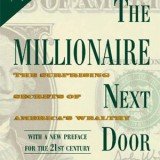
Back in the mid-1990’s, two guys named Thomas Stanley and William Danko wrote a book called The Millionaire Next Door. It was a compilation of their research profiling unassuming people who possessed a net worth of over one million U.S. dollars.

That was 20 years ago, so a million dollars today isn’t quite what it was then. Based on the current value of gold, US$1 million in the mid-1990’s equates to about US$3.5 million today.
That kind of money would give just about anyone a comfortable retirement. Even if $500,000 of that wealth were tied up in a debt-free home, you’d still be left with an annual passive income of $240,000, assuming an 8 per cent yield on the other $3 million. Not too shabby.
So how do you amass a nest egg like that? Here’s a summary, in my own words, of what Stanley and Danko reported about how unassuming people end up becoming very wealthy:
1. They start working early toward clearly defined, long-term goals.

Stanley and Danko found that millionaires would not wait until their income increased to begin investing. They would “save today's cash for tomorrow.” In Steemit terms, they would keep “powering up.”
Furthermore, when their income did increase, they resisted the urge to increase their standard of living. By keeping their focus on their clearly defined goals, they would be able to maintain the internal motivation required to make sacrifices and delay gratification.
2. They rigidly follow a household-spending budget.

Many of the millionaires that Stanley and Danko profiled claimed to have spouses who were “planners and meticulous budgeters” and who were even more conservative with money than they were. As partners, they were aligned on their goals and plans, and united in their commitment to meticulously plan their monthly household cash flow.
As John Maxwell says, it’s crucial to keep “telling your money where to go instead of wondering where it went.”
3. They forsake a status lifestyle in favour of financial independence.

Stanley and Danko found that the typical “millionaire next door” drives a boring middle class car and lives in an average middle class neighborhood. They are motivated by a desire for financial freedom, not by a need to be admired and respected by other people. Status objects depreciate and therefore lack value in the eyes of financially astute people.
People who are smart with money consider the opportunity cost of purchasing stuff that goes down in value. For example, rather than buying a new car on credit every two years, they quantify the future value of 30 years of car payments in light of compound interest.
4. Their parents trained them to be financially self-sufficient.

Stanley and Danko found that, at the time of their research, 80 per cent of America’s millionaires were “first-generation rich.” In other words, their parents weren’t loaded. They were forced to make their own way. By sacrificing and battling to achieve their financial goals, these millionaires developed the character to take responsibility for their own outcomes.
5. They refuse to fund lavish lifestyles for their children.

Just as they were taught to be self-sufficient, the “millionaires next door” also insist that their children find their own way. They connect their own success with the sacrifices that they had made and insist on their kids taking the same path.
Not only does this continue the generational blessing of sound fiscal responsibility, but it also insures that their children do not end up whittling away at their parents’ savings accounts later in life.
6. They tend to be entrepreneurial.

Stanley and Danko found that about half of the millionaires they profiled owned a business, and many of them worked in non-glamorous blue-collar professions. Rather than slave away for someone else, those who end up wealthy tend to prefer a working environment in which they can leverage off of the time of others.
Interestingly, they also found that millionaires who have more traditional jobs tended to prefer opportunities where they could serve or “target” wealthy people. Examples included financial planning, accounting and law.
In the future economy, I believe this entrepreneurial mindset will become increasingly more important. As automation ramps up, future wealth will belong to those who find creative ways to add value to the people around them.
7. They take calculated investment risks.

The unassuming wealthy avoid leaving significant amounts of money sitting around in low interest-bearing savings accounts. They educate themselves to achieve higher returns. In the past, that has come through the share market and real estate. Although Stanley and Danko found that millionaires occasionally invest in higher risk private business ventures, they tend not to gamble or speculate on things they don’t understand.
Millionaires invest in their financial education and the evaluation of their investment strategies. On average, millionaires invest almost twice as much time and energy into financial planning than non-millionaires in similar professions.
How much is enough for you?
If you can live a simple, minimalist life, you won’t need anywhere close to $240,000 per year. For most of us, a passive income of $80,000 per year, or even less, would be life changing.
In my day job, I mentor property investors. I first shared some of the ideas in this post in an article I wrote for PropertyInvesting.com
Follow Me: @jasonstaggers
I enjoyed this read. It's always nice to hear how the "other half" lives. Of course, my beloved and I have millionaire goals. Not that we want to float away into the sunset and contribute nothing to society but rather we have more time to be philanthropic and enjoy this life we have together.
My great-aunt and great-uncle lived this way, except they were not entrepreneurs. But, they both had well-paying jobs, and always lived below their means. After WWII, they built a modest house, and never moved from it, even when they could have afforded a much larger, fancier place. They lived in that house the rest of their lives, and eventually had no mortgage payment. They put tons into savings, and avoided going into debt; if they couldn't pay cash, they didn't buy it, including their cars.
Because they didn't have children of their own, they were able to be second parents to us, their nieces and nephews, and were generous with us. They bought me my first four cars, and paid for college for me.
After they were gone, they left an estate of over $1 million, and divided it between their nieces, nephews, great-nieces, and great-nephews in a series of trusts.
They were able to do whatever they liked, spending their money on experiences, like vacations to interesting places, and getting the newest technology gadgets (a hobby of my great-uncle), and didn't have to be concerned about money. And, both of them came from poor parents, and didn't go to college until they were grown and could pay for it themselves (they didn't take out loans to go, either).
All of the above advice makes sense. I've seen it work in the example of these two beloved people who played such large roles in my early life. They are examples to follow.
Wow, they really were great examples. I love not only how they saved, but how they spent - by giving generously to those they loved and on experiences, making memories with one another. Thanks for sharing that :)
Nice article!
thanks for the post
Thanks for the thanks :)
Refreshing read!
Thanks ozzy. Hope you can make it Wednesday night.
Yes I am traying to move my schedule to make it happen, I will let you know Tomorrow!
This post is great, I am giving it to my Kid to study this week, we will discuss some of the points of your post to do a 3 month experiment.
Thanks mate. That's really cool. Appreciate you sharing that.
Love the book The Millionaire Next Door!
It is a doozy. I'm sure you would have read it years ago when Luke worked for Ramsey.
Yep :)
My fav book is think and grow rich! Anyway, great read!
Yeah, Think and Grow Rich is one of my faves too. You should check out Earl Nightingale's condensed audio version if you haven't already. It's old school but a great overview.
Lead the Field (by Earl Nightengale Himself) is awesome as well :)
True, as is The Strangest Secret! That was the one that made him famous.
That would be great to get to a point where a person could passively earn $80,000 per year.
Or even $80k per year in SBD
Excellent post, Jason! How is it that I vote up all your posts (because they are awesome) and yet miss this one which hits it big? @corinnestokes just told me about it. My follow feed failed me on this one. :)
Great job!
Ha! Thanks Luke. I'll see if I can keep it going :)
Eventually you'll get picked up by a smart whale who runs an upvote bot, and you'll be on easy street! :)
I lay in bed at night and dream of such things :)
The summary of their work could be stated as they lived and approached life differently than their peers. If everyone did those same things, the result wouldn't be the same, as who would the saver be lending money to, if everyone saves and no one borrows?
Wealth inherently requires a commitment to think and live different, and this is constantly changing relative to what others are doing
Great post@jasonstaggers all the best ahead to all steemers
Thanks very much :)
You are very welcome.
Upset because I flagged your plagiarized post? The scammer is you trying to profit off of other people's hard work.
If they are not putting money as entry point yea? And they can cash in 35%straight away if they do a successful post I do not see the scamming? You have to understand the nature of steem, rewards if you add value to the Platform, is not a get rich scamm program, or a facebook like thing! has been designed to award great content, with time to get a vote is going to be even harder because your post have to be a quality one, please do not expect to take a picture of your hard earned sandwich and make 50k unless you are Kathy Perry, being famous help, having a previous audience helps, and ultimately working in great post and build an audience is all about!
alsoit steem is in Beta still a Baby (just imagine) once it matures Steem could be more Valuable, also Steem still in experimental phase traying to find market value and funtionality.
I am not sure how long have you been involved in to Blockchain technology experiments, but I can tell by experience that legit projects have huge potential! the last time that the scamming shadows were around me I have lost the opportunity to cash in 70 million dlls just because the oportunity came in a blockchain wrap package, (but it's ok not all is about money but about growing) I do advice to read the whitepaper VERY CAREFULLY and see if Steem is for you, I do not advice people to put any money on Steem but I do advice to my friends who are good Bloggers and great Photographers or tv presenters to join because Steem is so far the best option that they have to earn rewards in the Planet + is for free, as an investor I do put money in Steem Power because I see what could be if it succed ( I am waiting how the price settle to do my next move) + I am a long term investor with Steem at least I am targeting to droop 5 to 10k in SP and give it to my kids in 10 and 17 years, could be a worthles bunch of useless Steem Power or Could be a portion of the most succesful social media Platform.
I can afford to invest what I can afford to lose, I guess Time will tell.
As I always say once I jump in to a new project is
Time is our best friend!